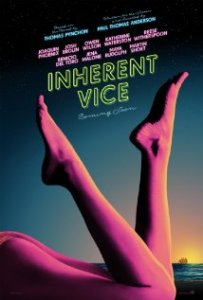 Paul Thomas Anderson’s adaptation of “Inherent Vice,” Thomas Pynchon’s classic pulp crime novel, isn’t so much about drugs as it is the idea of drugs. It’s quite easy to say the whole thing is a trip, but then there’s an unspoken nuance to all the little details that make it feel like a hallucination. The plot is so dense you couldn’t map it with a flow chart, but the subtle humor behind PTA’s rich and ever growing cast of characters puts a satirical edge on the whole cloak and dagger ordeal. You don’t unravel “Inherent Vice’s” plot; rather, to perpetuate the drug analogy, you just inhale.
Paul Thomas Anderson’s adaptation of “Inherent Vice,” Thomas Pynchon’s classic pulp crime novel, isn’t so much about drugs as it is the idea of drugs. It’s quite easy to say the whole thing is a trip, but then there’s an unspoken nuance to all the little details that make it feel like a hallucination. The plot is so dense you couldn’t map it with a flow chart, but the subtle humor behind PTA’s rich and ever growing cast of characters puts a satirical edge on the whole cloak and dagger ordeal. You don’t unravel “Inherent Vice’s” plot; rather, to perpetuate the drug analogy, you just inhale.
Joaquin Phoenix plays Doc Sportello, a ‘70s private investigator with a mutton chop beard sitting in a hazy blue bungalow, marijuana smoke drifting in from the frames. Like a sudden beacon of light in his calm world of Gordita Beach, Cali comes Shasta (Katherine Waterston), donning an orange, curvy sundress and “looking like she always said she wouldn’t”. Shasta’s an old ex of Doc’s, so she asks for his help. Her latest boyfriend is the wealthy real estate mogul Mickey Wolfman (Eric Roberts), and his wife and her fling want to commit Wolfman to a mental institution and steal his fortune.
Meanwhile, Doc gets a visit from the Black Panther Tariq Khalil (Michael Kenneth Williams) asking him to locate one of Wolfman’s associates, an Aryan Brotherhood biker named Glen Charlock. When Glen turns up dead, with Doc’s passed out body lying right beside him, Doc is hauled in by Lt. Detective “Bigfoot” Bjornsen (Josh Brolin). Bigfoot has a flat top hair cut and the hardened features of a man’s man who could find his place in just about any decade. He suspects Doc could help lead him to Wolfman and Shasta, who have now disappeared, and that Doc, stoned as he perpetually is, may know more than he actually knows.
That’s only the crust of all “Inherent Vice” has to offer, but this story and these characters alone feel so well drawn that you’ll follow it down just about any rabbit hole. The dialogue and narration by Joanna Newsom is all Pynchon, and in mere sentences he conveys personalities that seem fuller than anything in literature. Like “The Godfather”, these characters even have names that sink in even if you can’t place who they are. When they speak, they’re all business, but on closer scrutiny it’s pure screwball. At one point, Doc is attempting to track down The Golden Fang, which may be a boat, a gang, a company, or all three. How that makes any sense is anyone’s guess.
Very much like Robert Altman’s “The Long Goodbye”, whom Anderson owes a big debt in several of his films and especially this one, “Inherent Vice” is essentially a big pot for this rich cast of characters to stew. The film never stays put, but as Anderson follows Doc from place to place, there’s a sense of humor, sex appeal and sinister undertones that he carries along. We see it as Wolfman’s “sexy chicana” house keeper bends languidly in front of Doc as she serves his drink, or as Mrs. Wolfman’s hulking mass of a squeeze is introduced to us from the neck down.
But where Altman was potentially uninterested in the plot details of Raymond Chandler, Anderson is in deep with Pynchon’s mystery. At any point the film seems to be deceiving you, whether it’s a TV commercial beginning to talk directly to Doc, a group of troopers suddenly sneaking up on a remote building and disappearing behind brush, or perhaps most hilariously of all, a sudden outburst of “pussy eating”.
Did we really just see all that? Is any of this really happening? That Anderson plays with that perception constantly and still finds a way to cobble together all the pieces in ambiguous, uncertain ways, is part of “Inherent Vice’s” appeal to watch it not just once, but again and again, forever getting lost in its hazy, drug addled fever dream.
3 ½ stars



